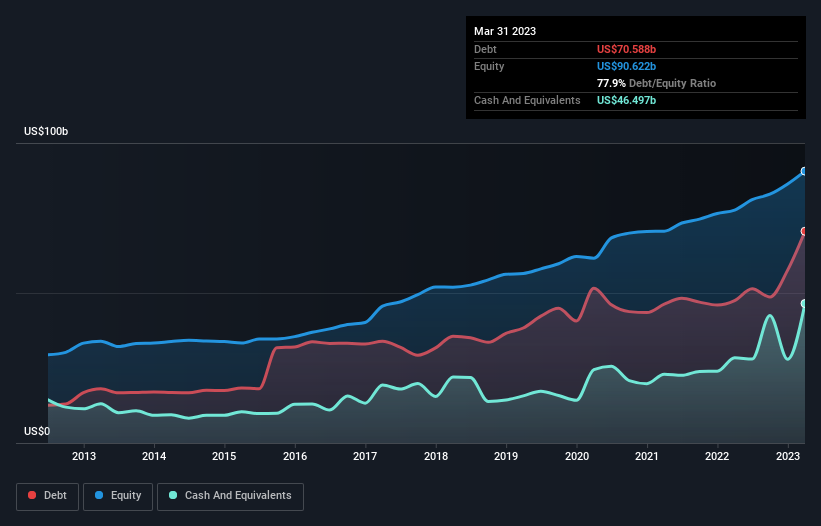- United States
- /
- Healthcare Services
- /
- NYSE:UNH
UnitedHealth Group (NYSE:UNH) Has A Rock Solid Balance Sheet

Warren Buffett famously said, 'Volatility is far from synonymous with risk.' When we think about how risky a company is, we always like to look at its use of debt, since debt overload can lead to ruin. Importantly, UnitedHealth Group Incorporated (NYSE:UNH) does carry debt. But is this debt a concern to shareholders?
When Is Debt A Problem?
Debt is a tool to help businesses grow, but if a business is incapable of paying off its lenders, then it exists at their mercy. In the worst case scenario, a company can go bankrupt if it cannot pay its creditors. However, a more usual (but still expensive) situation is where a company must dilute shareholders at a cheap share price simply to get debt under control. Having said that, the most common situation is where a company manages its debt reasonably well - and to its own advantage. When we think about a company's use of debt, we first look at cash and debt together.
View our latest analysis for UnitedHealth Group
What Is UnitedHealth Group's Debt?
The image below, which you can click on for greater detail, shows that at March 2023 UnitedHealth Group had debt of US$70.6b, up from US$47.5b in one year. On the flip side, it has US$46.5b in cash leading to net debt of about US$24.1b.

How Healthy Is UnitedHealth Group's Balance Sheet?
Zooming in on the latest balance sheet data, we can see that UnitedHealth Group had liabilities of US$116.5b due within 12 months and liabilities of US$76.6b due beyond that. Offsetting this, it had US$46.5b in cash and US$37.1b in receivables that were due within 12 months. So its liabilities total US$109.5b more than the combination of its cash and short-term receivables.
While this might seem like a lot, it is not so bad since UnitedHealth Group has a huge market capitalization of US$448.3b, and so it could probably strengthen its balance sheet by raising capital if it needed to. But we definitely want to keep our eyes open to indications that its debt is bringing too much risk.
We measure a company's debt load relative to its earnings power by looking at its net debt divided by its earnings before interest, tax, depreciation, and amortization (EBITDA) and by calculating how easily its earnings before interest and tax (EBIT) cover its interest expense (interest cover). This way, we consider both the absolute quantum of the debt, as well as the interest rates paid on it.
UnitedHealth Group has a low net debt to EBITDA ratio of only 0.75. And its EBIT easily covers its interest expense, being 12.3 times the size. So you could argue it is no more threatened by its debt than an elephant is by a mouse. Another good sign is that UnitedHealth Group has been able to increase its EBIT by 22% in twelve months, making it easier to pay down debt. When analysing debt levels, the balance sheet is the obvious place to start. But ultimately the future profitability of the business will decide if UnitedHealth Group can strengthen its balance sheet over time. So if you want to see what the professionals think, you might find this free report on analyst profit forecasts to be interesting.
But our final consideration is also important, because a company cannot pay debt with paper profits; it needs cold hard cash. So it's worth checking how much of that EBIT is backed by free cash flow. During the last three years, UnitedHealth Group generated free cash flow amounting to a very robust 98% of its EBIT, more than we'd expect. That positions it well to pay down debt if desirable to do so.
Our View
UnitedHealth Group's interest cover suggests it can handle its debt as easily as Cristiano Ronaldo could score a goal against an under 14's goalkeeper. And that's just the beginning of the good news since its conversion of EBIT to free cash flow is also very heartening. It's also worth noting that UnitedHealth Group is in the Healthcare industry, which is often considered to be quite defensive. Overall, we don't think UnitedHealth Group is taking any bad risks, as its debt load seems modest. So we're not worried about the use of a little leverage on the balance sheet. There's no doubt that we learn most about debt from the balance sheet. However, not all investment risk resides within the balance sheet - far from it. For example, we've discovered 1 warning sign for UnitedHealth Group that you should be aware of before investing here.
Of course, if you're the type of investor who prefers buying stocks without the burden of debt, then don't hesitate to discover our exclusive list of net cash growth stocks, today.
New: AI Stock Screener & Alerts
Our new AI Stock Screener scans the market every day to uncover opportunities.
• Dividend Powerhouses (3%+ Yield)
• Undervalued Small Caps with Insider Buying
• High growth Tech and AI Companies
Or build your own from over 50 metrics.
Have feedback on this article? Concerned about the content? Get in touch with us directly. Alternatively, email editorial-team (at) simplywallst.com.
This article by Simply Wall St is general in nature. We provide commentary based on historical data and analyst forecasts only using an unbiased methodology and our articles are not intended to be financial advice. It does not constitute a recommendation to buy or sell any stock, and does not take account of your objectives, or your financial situation. We aim to bring you long-term focused analysis driven by fundamental data. Note that our analysis may not factor in the latest price-sensitive company announcements or qualitative material. Simply Wall St has no position in any stocks mentioned.
About NYSE:UNH
UnitedHealth Group
Operates as a health care company in the United States and internationally.
Outstanding track record, undervalued and pays a dividend.
Similar Companies
Market Insights
Community Narratives



